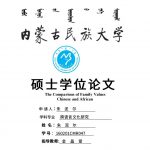硕士学位论文
The Comparison of Family Values
Chinese and African
申 请 人:朱 泥 尔
学科专业 跨语言文化研究
姓 名: 朱 泥 尔
学 号: 160201CMR047
指导教师: 金 晶 爱
论文提交日期:二○一九年三月
ABSTRACT
This paper looks at a comparative analysis of family values and interpersonal relations between Chinese and Africans, and also their impact on the intercultural activities. More importantly, it analyzes the underlying reasons for the cultural differences between African and Chinese families with a look at the aspects of attitude to the family, its members and their relationships, marriage, family management, education, time and time perception, affiliation and identity. China supported Africa’s struggle for independence and the uncompromising commitment to the total liberation of the entire continent at a time when a fair number of western responses, especially by colonial powers epitomized nothing less that prevarication and recalcitrance. On the other hand, Africa gave total support in her struggle for acceptance in the global community of nations, especially her membership in the United
Nations.
As the oldest and the most fundamental of all human institutions, it is also universal and found in every culture therefore we constantly see governments evolving, and even disappearing, in numerous countries, yet in each of these nations the family always survives. Nowadays, with the acceleration of global economic integration, cross-cultural communication between China and Africa is becoming more and more frequent therefore this research can undoubtedly help Chinese people and African people to further understand each other and their family values. In this write up, I outline some of the similarities and then show that despite these not-so-tenuous historical, cultural, and linguistic relations between Africa and China, there has not been as much interaction and cooperation between them. As well, this comparative analysis on Sino-African family values is crucial and meaningful mainly since Cultural difference is one of the most fundamental elements to cause conflicts and confrontations in intercultural communication.
Key words: Filial piety, Marriage, Education, Family Management
Introduction
Family from Latin ‘‘familia’’ is the most fundamental unit among all human society in the world. The primary functions of the family involve providing a framework for the production and reproduction of persons biologically and socially. Moreover It reflects the ethical values of a society, its cultural characteristics and the unique features of a nation. People begin to learn anything about the world and their culture through the family they are brought up in. The way you act, the way you think, even your language, are all transmitted through the family from the wider cultural context. This context includes the culture in which you live, and those from which your ancestors have come, which is named family values in general. Family values are the center in the research of cultural values, and it has a huge influence on people’s thoughts and behaviors. Yet if we want to know the cultures of different nations, it is necessary to know their different family values. In this paper we will analyze family values from different aspects, including the relationship between the parents and their children and the husband and the wife, the concept of the marriage as well Family in addition Education.
Research questions
The research undertaken focused on 3 (three) main research questions:
– why Chinese and African family values are completely different?
– Are they any similarities between Chinese and African Culture?
– How can we improve a better understanding of those cultures?
Significance of the study
As the pace of the global economic integration accelerates, cross-cultural communication between China and Africa is becoming more and more frequent and more important and this research can undoubtedly help Chinese people and African people to further understand each other and their family values and to avoid unnecessary conflicts caused by the misunderstanding and mistakes. This comparative analysis on Sino-African family values is crucial and meaningful mainly since cultural differences is one of the most fundamental elements to cause conflicts and confrontations in intercultural communication.
1The Definition of Family
The basic unit in society traditionally consisting of two parents a father and a mother trying to educate their children. In the other hand, family has been defined as a group of people to live together by bonds of blood, marriage, adoption to form economic ties, to fertilize and to bring up children. According to this idea, families form the continuation through child rearing. Also there is another explanation of family. It says in the word ‘Family’ each letter represents a single meaning, and that is the letter ‘F’ means father, the Letter ‘A’ is and, the letter ‘M’ means mother, the letter ‘I’ means I, the letter ‘L’ is defined to be love, and the last letter ‘Y’ means you, so the whole meaning should be ‘Father and mother I love you’. Clearly family is made by three people, father, mother and their child in general. The Chinese say if you know the family, you don’t need to know the individual .In Africa the saying is, A person who has children does not die. The family community was the fundamental element of the African, this basic sphere of action, through which he became integrated with the larger, human community…he always acted from within the sphere of the family (Kisembo, 1998, pp.208-203). Each person in African traditional life lives in or as a part of family (Mbiti 1975, p.175).Nevertheless, some researchers deem that the main purpose of the African family is to bring happiness to each individual family member. Christianity brought some challenges to traditional African practices such as polygamy by equating it with adultery and sin. It also promotes monogamy as the only morally accepted type of marriage. Monogamy, though present and practiced in traditional Africa , was not as widely spread as polygamy( waruta,2005,pp108-109). influence factors to the family values. While we have found that a limited number of the studies on the changes of the family values in both Chinese and African family, the aim of my research is expected to do further research to this aspect.
Very few African scholars made investigation on this field.
Family values
Family values are political and social beliefs that hold the nuclear family to be the essential ethical and moral unit of a society, and they are considered as an important part of a country’s traditional cultural values. Family values, as the core of the value system, not only refer to the family members’ norm of behaviors but also are a standard of measuring the norm of conducts.
Concept of Value
Important beliefs or ideals shared by the members of a culture about what are good o, bad , desirable , undesirable , important, useful, beautiful, desirable , appropriate. Values have major influence on a person’s behavior and attitude and serve as broad guidelines in all situations. Values are considered subjective, varying across people and cultures and are in many ways aligned with belief and belief systems. Everyone has his own values which affects his behavior. Therefore in order to understand people and their culture, we must come to understand the values and beliefs that motivate their behaviors.
The Meaning of Family to Chinese and Africans
There is probably no family in this world loving their families more than Chinese. Since China is a country whose agriculture has dominated the economy for thousands of years. Families generally maintain self-supporting family farms or activities for more than one generation. In the past, the Chinese used to and were willing to gather together with the family. Settling down a place, and then they live there, bear there, eventually die there; it appeared to be an endless circle of the Chinese life. They knew well their place they called home. A home for a Chinese, not merely is a house built with cement and wood, but also a world belonging to them only. A traditional Chinese family generally consists of at least two generations of people. However, along with social progress and small size, simple structure and diversified patterns of families have Changed and become the main features of modern Chinese families. Nevertheless, the viewpoint of Africans on family is a bit different. Some African families are extremely mobile, they move from time to time for their respective reasons. Nowadays , family in Africa has been defined as one in which a husband and a wife or wives ( polygamy ) and children live with their mothers . The father is a full-time worker who earns enough money to allow the mother(s) to be a full-time housewife. Each wife lives in a single-family home, the parents are mostly not divorced, and the children are natural or adopted. Sometimes due to economic conditions When the children reach the age of 18 or get married, they usually have to find their own way to move out and find a new place to live. I personally found myself In China another continent far away from my home at the age of 23 years . And when the parents get old, they usually go back in their countryside than live with their children. Although this family pattern is still very much cherished by many Africans, alternative family forms have become more common. These include homosexual relationships, single-parent households.
Studies on Furstenberg Theory.
No matter which country you come from, what nationality you belong to. Family is a person’s first school, and the parents are the first teacher. Either in China or in Africa, either at ancient times or at modern times, family education is always in the most fundamental position.
Each person in African traditional life lives in or as a part of family (Mbiti 1975, p.175). Family strategies adopted by many parents are, to some extent, done so in response to the level of risk present in their neighborhoods (Furstenberg et al. 1999). Faced with uncontrol disorder, evidence of drug use, prostitution, many parents try different ways to make the best of their parenting and management styles to protect their children from the dark part of our society of these conditions (i.e. exposure to violence, association with negative people). Some parents respond to difficult financial conditions by using more preventative parenting practices, such as some African families while others choose to develop enriching activities for their children such as some Chinese families (Earls, McGuire, and Shay 1994; Furstenberg 1990). There are very few studies, however, that have actually examined parental management styles, also including neighborhood conditions and youth outcomes. The present study proposes to address all three, by employing a theoretical framework derived from Furstenberg et al’s (1999) family management model. Furstenberg et al’s (1999) Family Management Model Parents play an integral part in the successful education of their children no matter the country or continent . The quality of relations between parent and child reflect significantly upon the child’s individual developmental trajectory (Maccoby and Martin 1983).
FIGURE 1: Illustration of Furstenberg et al’s (1999) Theoretical Model
1Measuring Disorder
Disorder has been defined in several ways: From neighborhood hassles/problems to community incivilities (Romano, Tremblay, Boulerice, and Swisher 2005; Seidman et al. 1998; Taylor 1997; 2002). Wilson and Kelling (1982) adopt a more criminogenic meaning of disorder, describing it as an accumulation of minor violations, whereas Sennet (2009) suggests that disorder may be characterized as perceived neighborhood decay. One of the main criticisms levied at disorder research has been the overdependence on experiential measures of community disorder (elicited from surveys or interviews). Consequently, researchers have attempted to define neighborhood disorder by objectively obtained measures and not the perceptual measure so often used in the disorder literature (Sampson and Raudenbush 1999). One of the potential caveats of using perceived disorder is its aggregation to the neighborhood level, which may mask individual differences in how residents react to the disorder in their community
Comparative Analysis
For Chinese and Africans family plays a significant role to them. In a family, the main issues people often talk about are the relationship of the family members, marriage and family education. Chinese families focus more on authority, harmony of family, filial piety, and their obligations to the family. While because of the polygamy in Africa the practice of maintaining several spouses simultaneously many African family members pay great attention to the concepts of individual equality, independence, individual right therefore each wife leaves a part and pays a great attention only on her children, among which the most prominent concepts are independence and equality. There is a difference between Chinese family and African family.
.3 Marriage
What does Marriage mean? By definition , marriage is the legal union of a man and a woman as husband and wife Marriage and family sociologically signifies the stage of greater social advancement. It is indicative of man’s entry into the world of emotion and feeling, harmony and culture .As is known to all culture including social system and relations spirituality ,value, way of thinking art language and custom ,is gradually gained and developed when people living together form a common understanding of concepts and ideas and follow certain rules and norms. As one form of traditional customs. Gradually, wedding tradition obviously becomes part of cultures. Considering Chinese and African different social systems , thoughts and values their wedding traditions have their own features
Chinese Marriage
At old times, as a rule, a traditional Chinese marriage was determined by parents and matchmaker. They pay more attention to the factor that the families of the bride and bridegroom are of equal position in the economic situation and social scale. Love is not essential for traditional Chinese marriage, and even is unnecessary part of a marriage. The compatibility of the horoscope and the elements of birth such as year, month ,day and time of birth of a couple and the family background were important considerations when deciding to marry. It was important that this information be gathered by a marriage broker called a “mei po”:and that the date of birth be assessed by geomancer. So love-absence marriage became most striking tragedy of Chinese women at old times. Although nowadays this kind of marriage does not exist any longer and most young people pursuit to marry someone they truly love and claim freedom of love. Still parents play a crucial role in marriage that till young couple have the permission of their parents, they get married. From the day the couple met and fell in love to the time they decide to marry they may host a dinner for the exchange of engagement rings in the presence of parents and friends
African Marriage
Many African weddings, particularly first marriages involving young couples, are the result of mutually feelings aand attraction rather than practical consideration. Young people are expected to find their lovers a husband or a wife on their own effort. The Africans believe that young people should fall in love and then decide to marry someone they can live happily with. Their parents do not usually help them or interfere in them. In some cases relatives can interfere and help out . Mostly weddings are celebrate in church due to their belief and end up in a traditional way at home such as the Himba people of Namibia have a special and unique way to take a bride to their house. They first kidnap a bride before the ceremony and then they dress her in a leather marriage headdress decorated with beautiful African jeweler. After the marriage ceremony she is brought into her father’s house where the family tells her what are her responsibilities as the wife and in the end they anoint her with butterfat from cows. This process of the wedding shows that she has been accepted into the family. In the other hand In Niger people most of the time court their cousins for marriage. Before marriage the male cousins wears special and powerful amulets which are supposed to show their attractiveness to the girl. First the family of the groom gives their “bride price” to the bride’s family and the couple is consider married. After this a bride stays with her husband until she becomes pregnant ,then after her pregnancy she returns to her father’s home. Here she will remain for the next 3-4 years.
Education
– Chinese Concept of Education
Education is still influenced by the traditional family values. Because of the impact of
Confucianism, there has always been an inequality between the status of the parents and children. Parents as the authority are the dominators of the family. Therefore, when making some family decisions, children are forced to follow their parents’ authority, and Chinese parents are more likely to arrange everything for them instead of advising them. Now with the improvement of the living standard and the implement of family planning, many families go to another extreme. Because of only having one child, parents as well as grandparents cherish their kids too much and some are overprotecting their little kids that they meet everything their little king and princess want, give the best things they think to their children, and even take the place of their children to do all the things that ought to be done by their children themselves. This is not good for the children at all, which makes the child self-centered, dependent and willful, and causes another inequality of interpersonal relation of the family as well.
– African Concept of Education
Africans take individual as a focus paying great attention to individual freedom and right. And in education, African parents pay great attention to raising children’s independent consciousness since childhood. They think of the child as an equal member in the family, respect the child’s personality and dignity, and let the child think independently and choose freely. Children are encouraged to work out all kinds of problems they come across on their own and make decision in the condition of the permission of the society. They respect the child’s right, Parents’ responsibility only lies in discovering and guiding the child’s interests and potential ties, creating the advantageous environment for the child, paying attention to the communication with the child, and the educational reciprocity. The concept of African family education stresses on cultivating children’s ability of adapting varieties of environments and ability of independence of living. They attach importance to children’s self-training and believe that children should depend on their strength and effort to grow up. Hence, they pay much attention to develop children’s consciousness of independence and train their ability of living. The common method they usually use is to let children go. As long as children are kept safe, parents try their best to give their children chances to do whatever they can and want.
Reasons of Differences Cultural
Almost six years of living, and travelling in China and Asia however tell a different story. My experiences as an African living in China show that Africa is not much present in the minds of Chinese as other parts of the world are in their minds. In the streets of big cities such as shenzen, shanghai , Hong Kong, Beijing, at least those I have interacted with, know next to nothing about Africa, as they know about other parts of the world. Even in academic and other elite set-ups, Africa and African affairs and studies do not feature much. Compared to the institutions of Europe and America, some Chinese universities and colleges have very little content about Africa.
Influences of Religions And Beliefs
In Africa
It has been admitted by many authors that Africans do not know how to live without religion. The traditional African society was almost characterized by the absence of atheist; religion in the indigenous African culture was incorporated into the society’s institutions. It was and stills an integral part of the entire culture. For Africans, religion is something practical; each action is reflective to one’s religious concepts and practices. It is the basis of the social morality. For instance, Idowu Bolaji (1962) said: “With the Yoruba, morality is certainly the fruit of religion. They do not make any attempt to separate the two; and it is impossible, for them to do so without disastrous consequences”. The traditional African culture tailors on it moral and religious attitudes. Thus, “the ancient African was far from being an abode of laissez-faire morality. There were strict moral principles and determined code of conduct, which established the nature of right-doings, and custom established penalties and taboos against malefactors. Moral sanctions were mainly religious sanctions and were effective”. The religion has also been the core of traditional Africans’ life, no matter on whom they believe or attached their faith.
In China
However, Chinese are characterized for having a deep belief in the forces of death and of a life after death. In the ancient time, from emperors to peasants, life and death were inseparable and continuous. One reason is that the Chinese believed their ancestors’ souls could treat them well or harm according to how good or poorly they revered them. Post-mortem rituals that society today regards as ancient Chinese religious practice were merely threads of everyday life, interlaced into a cultural fabric as spiritual as it was secular. Chinese religion is not like attending church, synagogue or mosque,<bring to Africa by Europeens> but rather carrying out duties that honoured previous generations of one’s kin. Imperial tombs were filled with fabulous riches, sealed with human sacrifice in the earlier dynasties, at least and guarded like the palaces of the living. Peasants, meanwhile, buried their dead with far more modest accompaniments: crops from their farm fields or other symbols of goodwill, but no less devotion. Intermingled with such piety are beliefs in spirits that governed the stars, weather, forces of nature, animals, etc. Despite a strong cultural emphasis on magical and mystical forces, ancestral worship is not merely folk religion
Conclusion
This paper makes a contrastive study of Chinese and African family values, including the attitude to the family members and their relationships, marriage, family education and makes an analysis of the reasons for their differences from religion and belief. The characteristic of Chinese and African values are collectivism. To Chinese people, there is always a concept of “we”, and they consider that “I for everybody and everybody for me” is their life creed; compared with Chinese, in the other hand Africans share the almost same opinion, but they mostly believe in “everybody for oneself, God for everybody”.
Summary
Chinese people have an hierarchy in which they know their position and the rules for behavior in the situation. Especially they show their high respect on the seniority and attach importance on filial piety. On the contrary, Africans value independence, equality among Men. In African families, parents and children can be equal, and they respect with each other. Now along with the globalization, the communication between Chinese and African is more frequent than before. Their cultures as well as family values collide with and learn from each other. Chinese people now are aware of the importance of independent consciousness and African people are paying more attention to the intimacy among family members.
suggestions
Not all issues of Sino-African Family Values could have been possibly handled here.One also needs to know how Africans on the African continent think of Asia and the nature of Asian communities in Africa. All in all, it is meaningful to study the different family values in Chinese and African cultures for the benefit of the improvement of their relationship, as well a good understanding of the differences will surely facilitate the cross-cultural communication of two peoples. As well African universities need to attract more Chinese students for a better exchange.





